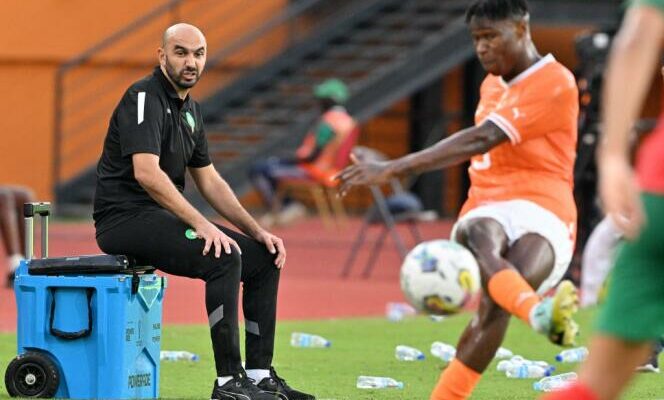Forever the first African semi-finalist in a World Cup, Morocco is desperate to win a second African Cup of Nations (CAN), forty-eight years after its only continental coronation, and wants “overcome the curse” in Ivory Coast, warns his coach Walid Regragui.
“The more the African competitions progress, the further we move away from the date when we won the CAN (1976), but that is no reason to put pressure on ourselves”, declared the technician during the presentation of his list of 27 players. However, he did not spare himself, just after the end of the World Cup in Qatar in 2022, by announcing that he would resign if the Atlas Lions did not win the future CAN.
From now on, the technician, who delighted journalists with his frankness and fresh tone during the World Cup press conferences, is less categorical. On the Moroccan channel Arryadia, he clarified: “We want to stay at the same level. I want to reach at least the semi-final. » “If I don’t succeed, I will leave and the new coach will have to continue in the same state of mind. This is how Morocco will progress”added the coach, under contract until June 2025.
” State of mind “ often comes up in Regragui’s mouth. Already, in Qatar, he had convinced his players that they had to aim at the top, the title of world champions. In Ivory Coast too he aims for total victory, and this time leaves with the status of big favorite, even if he wants to be more cautious: “We are going to go there to play our football, to give our best and above all to have no regrets. » “What is important is the state of mind”insisted Regragui, “we must go there with complete confidence to overcome the curse of the African Cup.”
Spine
Indeed, if Morocco is one of the most frequent representatives of Africa in the World Cup, with six participations, of the 8are memorable finals in 1986 and a historic semi-final, the kingdom has only won one CAN in 18 appearances. It was in 1976, in Ethiopia, with the equalizer of Ahmed Makrouh, alias “Baba”, at 88e minute of the final. Guinea, which led 1-0, was already victorious.
Morocco has therefore experienced many setbacks, including the defeat in the quarterfinals against Egypt (2-1 ap) two years ago which ended in a fight between players and staff in the corridors of the Amadou-Ahidjo stadium in Yaounde. In 1988, goalkeeper Badou Zaki, hero in Mexico two years earlier, let a Cyrille Makanaky strike slip through his gloves in the semi-final in Casablanca, making an entire country cry. The Marouane Chamakh-Youssouf Hadji generation came close to the title, finalist in 2004, beaten by Tunisia (2-1) at home.
It is to ward off these bad memories that Regragui decided to rely on the same team as in Qatar, with its backbone Yassine Bounou, Achraf Hakimi, Romain Saïss, Sofyan Amrabat, Hakim Ziyech and Youssef En-Nesyri.
He even strengthened the competition with Marseillais Amine Harit, who had seriously injured his knee shortly before the World Cup, and brought up some young people like Ismaël Saibari (PSV Eindhoven) or Chadi Riad (Betis Sevilla). “We have a good balance between the present and the future”, estimates Regragui. Saibari and Riad won Morocco’s first CAN Espoirs in 2023, and showed their elders how to break a curse.
